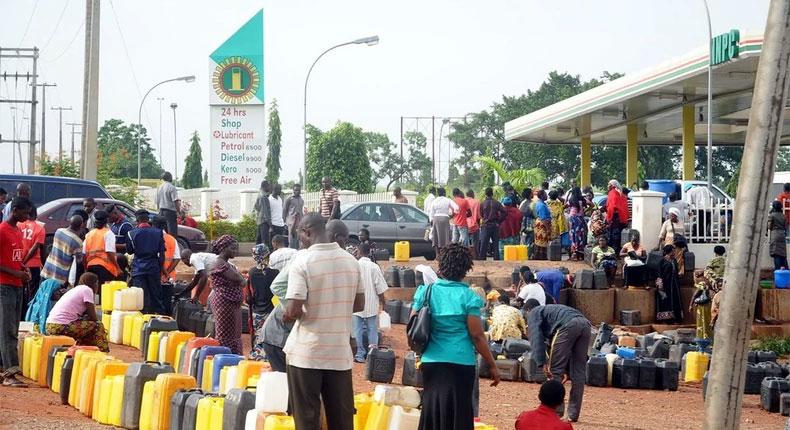Amidst long queues at different filling stations, there were indications on Friday that the scarcity of fuel will end in the next few days.
Apart from the assurances given by the National Economic Council (NEC) meeting, comprising of the 36 state Governors and the Governor of Central Bank of Nigeria (CBN) with Vice President Yemi Osinbajo presiding on Wednesday, our correspondent gathered that the federal government has directed all filling stations to start 24-hour operation to make the product available to the buyers.
The Group Managing Director (GMD) of Nigeria National Petroleum Company (NNPC), Mele Kyari, had told the Council that 30 vessels laddened with petrol are expected to berth at Apapa Port in Lagos
before next week. According to him: “30 vessels to deliver an additional supply of 2.3 Billion litres of PMS into the country till month-end February, 2022.
“NNPC as the supplier of last resort has continued to sustain adequate petroleum products supply and distribution to the Nation despite challenges associated with the unending waves of pipeline vandalism, product theft and cross-border smuggling of PMS.”
On the long queues noticed at filling stations, the NNPC boss declared that the company’s strategy is on for restoring stability in PMS supply and distribution by boosting incoming PMS supplies, recertification and release of In-country PMS stock and enhancing distribution management.
The NEC meeting which had in attendance the Minister of the Federal Capital Territory and some other members
of the Federal Executive Council (FEC), also resolved to encourage the growth of the automotive industry in Nigeria by improving patronage of locally manufactured vehicles.
Briefing Council on the benefits of locally manufactured vehicles in the country, Minister of Industry, Trade and Investment, Otunba Niyi Adebayo, said despite the potentials, the local automotive industry
has been significantly plagued by several challenges such as weak demand for locally assembled cars, as well as lack of government patronage which could have assisted the assemblers in achieving economies of scale.
Read Also: Bayelsa Governor Unveils Monthly Business Empowerment Package
According to him, the Nigerian Automotive Industry has been identified as one with a catalytic effect on the economy.
He, therefore, called on NEC to note that the industry has achieved US $1Billion in foreign direct investments, 63 licenses issued, over 30 Active Assemblers and demand for 400,000 vehicles per annum.
The Trade Minister further briefed Council that 60% of the Nigerian population is under 35 years of age and that
by 2050, Nigeria’s population is expected to double (becoming the 3rd largest country in the world) with over 13.8 million youth within the labour force bracket.
Adebayo introduced the Jubilee Fellows Programme as one of the measures to address the increasing population of unemployed youths. The programme will connect 20,000 graduates annually to opportunities in Private and Public Sector Institutions, create a talent pipeline for Private & Public Sector to draw from and provide a platform for
high level public & private sector policy dialogue on Employment Creation & Talent Management, etc. According to him, the deployment of the programme’s Cohort and First Placement is expected to be done by April 2022 with the current numbers being116,763 applications from prospective fellows received and 5,898 Private sector institutions Expressing interest to Host Fellows.
On the programme financing, the Minister disclosed that the goal is to mobilise $260 Million over the five year Programme period adding that already European Union has committed 44Million Euros into the Fund.
The Council also received an update on the Covid-19 vaccination by the Executive Director, National Primary Health Care Development Agency (NPHCDA), Dr. Faisal Shuaib, who called on NEC to note that by March, 2022, the country needs to reach 50% of eligible vaccination at least for the first dose and that by December this year, the plan is to achieve 70% full vaccination rate.
He added that five States namely Nasarawa, Jigawa, Ogun, Osun and Kwara including FCT are hitting the mark.
The Council, therefore, resolved that state authorities should prioritize vaccination of citizens against the disease and that since Lagos, and FCT carry the highest-burden, whatever support is necessary should be made available to them.






